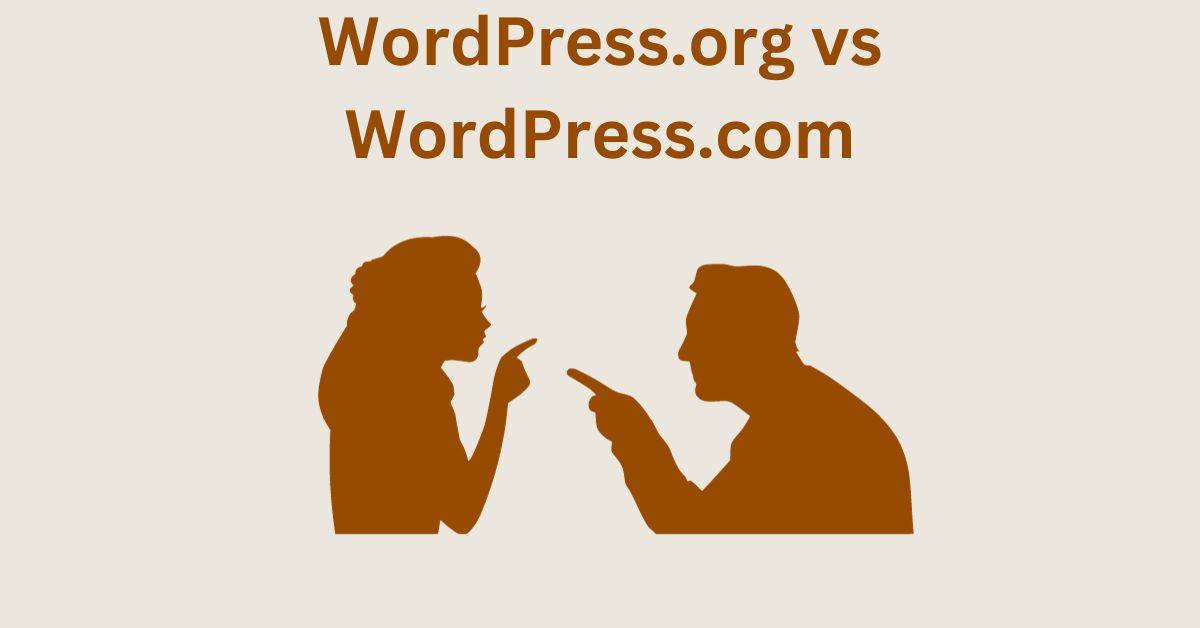Difference Between WordPress.org and WordPress.com
Estimated reading time: 5 minutes
Last updated on March 26th, 2024 at 06:47 am
Do you want to know the “Difference between WordPress.org and WordPress.com”?
Imagine Building a House
Okay, so you want to build a website, right? Think of it like building a house.
You have two options for the land you want to build on.
WordPress.org – The Land You Own
With WordPress.org, it’s like owning your own plot of land.
You have complete control.
You can design your house (website) the way you want, add any fancy furniture (plugins) you like, and even paint the walls (customize the code).
It’s super flexible and powerful.
Did you know that 38% of all websites on the internet use WordPress?
That’s like saying a lot of people choose to build their houses on this type of land because it’s so versatile.
WordPress.com – The Rented Apartment
Now, WordPress.com is like renting an apartment.
It’s convenient because someone else takes care of the maintenance, like fixing leaks (updates and security).
But, you can’t change the structure too much. You can’t add another floor or paint the exterior.
It’s simpler and maybe quicker to set up, but you have fewer options for personalization.
Over 35% of bloggers use WordPress.com for their blogs, so it’s like a cozy rented space for those who prefer a hassle-free setup.
Let’s talk in detail.
WordPress.org vs WordPress.com – The Difference

1. Price Comparison
Imagine you’re choosing between two options to build your online home.
WordPress.org is like owning your own house, while WordPress.com is like renting an apartment.
With WordPress.org, you pay for your hosting and domain like you pay for your house.
On the other hand, WordPress.com is like paying rent with different plans. Did you know?
WordPress.org powers about 43% of all websites, showing it’s a popular choice for those who want more control over their costs.
2. Design and Customization
Think of your website like your favorite t-shirt. With WordPress.org, it’s like tailoring that shirt to fit you perfectly.
You have full control over the design, adding your own flair.
WordPress.com, however, is like choosing a pre-made shirt.
You can pick from existing designs but with limited customization.
Fun fact: WordPress.org offers over 58,000 free plugins for customization, making it a playground for creativity.
3. Plugins and Extensions
Imagine your website is a smartphone. Plugins and extensions are like apps that add cool features.
With WordPress.org, it’s like having an open app store – you can add as many as you want.
On the flip side, WordPress.com is like having a curated app store. You can only add specific plugins approved by WordPress.com.
The freedom of choice in plugins has led to WordPress.org having over 58,000 plugins available, while WordPress.com has a more limited selection.
It’s like choosing between an open playground and a neatly arranged garden for your website features.
4. Hosting and Maintenance
Imagine your website is a car. With WordPress.org, it’s like owning the car and choosing where to park it.
You’re responsible for finding a good parking spot (hosting provider) and maintaining the car (updates).
On the other hand, WordPress.com is like using a car-sharing service.
They take care of the parking and maintenance, but you have less control.
Many prefer the flexibility of WordPress.org, where you can choose the best hosting provider for your needs.
5. Security and Backup
Think of your website as a fortress.
With WordPress.org, you’re the castle owner, responsible for hiring your guards and setting up security measures.
You decide how often to create backup copies of your castle (website).
With WordPress.com, it’s like living in a gated community.
They handle security, but you might have less control.
Surprisingly, 30,000 websites are hacked every day, emphasizing the importance of robust security measures.
6. SEO and Marketing
Imagine your website is a book, and you want it to be found in a library.
With WordPress.org, it’s like having control over how your book is catalogued and displayed.
You can use various SEO tools and strategies to make it more discoverable.
WordPress.com is like having the library staff handle most of it, but you might have fewer options.
Considering that 93% of online experiences start with a search engine, optimizing your site for searchability is crucial.
7. Support and Community
Picture your website as a neighbourhood.
With WordPress.org, it’s like being part of a community where everyone helps each other out.
There are forums, blogs, and experts ready to assist.
On the other hand, WordPress.com is like living in a building with a concierge.
They offer support, but it might be more limited.
It’s worth noting that WordPress powers around 43% of all websites, creating a vast and supportive community for users of both WordPress.org and WordPress.com.
Conclusion – WordPress.org vs WordPress.com
“I Recommend WordPress.org”
If you want the most control and flexibility over your website, I recommend using WordPress.org.
With WordPress.org, you can customize your website just the way you like it, without many restrictions.
You can add plugins, choose from a wide variety of themes, and even tinker with the website’s code to suit your needs.
While WordPress.com might be fine for beginners or casual bloggers, it’s not as powerful as WordPress.org.
With WordPress.org, you can make your website grow, improve its search engine optimization, and own your content completely.
This is important if you have big plans for your website in the long run.